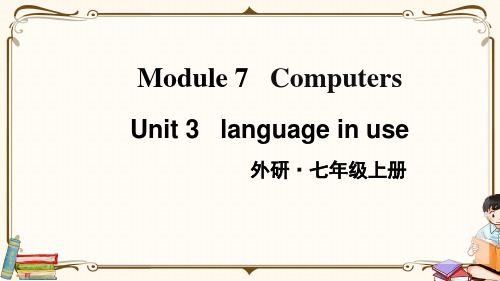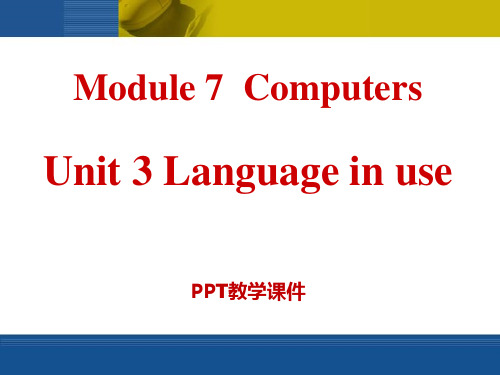第一部分 模块七 Unit 3.ppt
合集下载
外研版七年级上册英语 Module 7 Unit 3 教学课件

• 你的父母住在哪里? Where do your parents live?
(3)疑问形容词:
what time (询问具体时刻) how old (询问年龄)
what colour (询问颜色)
how far ( 询问距离)
how often (询问频率)
how many (询问可数名词的数量)
— Where do you save your homework? — I save my homework in a document.
— _______________________________. — _______________________________.
2 Complete the conversations. —Where do your grandparents live? —They live in Australia. 1 —_H_o_w__d_o__I________ save my document? —Click “save”and “OK”. 2 —_W__h_a_t_d_o_e_s_h__e_d_o____ with his computer? —He sends email.
• 谁在房间里唱歌? ( who 作主语) Who is singing in the room?
• 在你手里的是什么? ( what 作主语) What’s in your hand?
(2)若疑问词作其他成分,即对其他成分 提问,其语序是: 特殊疑问词+一般疑问句或特殊疑问词+ be/助动词/情态动词十主语+谓语十其他?
4 My mother doesn’t __l_ik_e___ computer games.
(3)疑问形容词:
what time (询问具体时刻) how old (询问年龄)
what colour (询问颜色)
how far ( 询问距离)
how often (询问频率)
how many (询问可数名词的数量)
— Where do you save your homework? — I save my homework in a document.
— _______________________________. — _______________________________.
2 Complete the conversations. —Where do your grandparents live? —They live in Australia. 1 —_H_o_w__d_o__I________ save my document? —Click “save”and “OK”. 2 —_W__h_a_t_d_o_e_s_h__e_d_o____ with his computer? —He sends email.
• 谁在房间里唱歌? ( who 作主语) Who is singing in the room?
• 在你手里的是什么? ( what 作主语) What’s in your hand?
(2)若疑问词作其他成分,即对其他成分 提问,其语序是: 特殊疑问词+一般疑问句或特殊疑问词+ be/助动词/情态动词十主语+谓语十其他?
4 My mother doesn’t __l_ik_e___ computer games.
外研版七年级英语上册教学课件:Module 7 Unit 3 (共28张PPT)

6. 你发送多少邮件? _H__o_w__m_a_n_y__ emails _d_o__y_o_u__se_n_d__?
B. 根据首字母提示完成短文: Lingling wants to write her homework
on the computer. (1) B_u_t__ she doesn’t know (2) h_o_w__ to do it. Daming is helping her. (3) F_ir_s_t_, use the mouse and click “new document” to (4) o_p_e_n_ it.
I was born in 2000. 出生 The size of my shoes is 35.
questions Do you have a computer at home? Do you use a computer for your homework?
Name 1 Name 2
A. 完成句子: 1. 请打开灯,天太暗了。
2. Where do I write the name? I write the name in the box.
3. What do I do next? Next, I click “save” and “OK”.
特殊疑问句:特殊疑问词+ 原句一般疑问句
Match the questions with the answers. 1. Where do you save your homework? 2. When do you use a computer? 3. How many emails do you write every
Cfoormmpolfettehethweospreldnasntefnrnvoc.p. 打em计lasn算划wtshtihetpmh/lbaapntkolahextnoea.fdpcoorloassrnttrhhfeocrt
B. 根据首字母提示完成短文: Lingling wants to write her homework
on the computer. (1) B_u_t__ she doesn’t know (2) h_o_w__ to do it. Daming is helping her. (3) F_ir_s_t_, use the mouse and click “new document” to (4) o_p_e_n_ it.
I was born in 2000. 出生 The size of my shoes is 35.
questions Do you have a computer at home? Do you use a computer for your homework?
Name 1 Name 2
A. 完成句子: 1. 请打开灯,天太暗了。
2. Where do I write the name? I write the name in the box.
3. What do I do next? Next, I click “save” and “OK”.
特殊疑问句:特殊疑问词+ 原句一般疑问句
Match the questions with the answers. 1. Where do you save your homework? 2. When do you use a computer? 3. How many emails do you write every
Cfoormmpolfettehethweospreldnasntefnrnvoc.p. 打em计lasn算划wtshtihetpmh/lbaapntkolahextnoea.fdpcoorloassrnttrhhfeocrt
Module 7 Unit 3 (35张)精品课件

Ask the questions in your questionnaire. Make notes of the answers of your classmates.
Talk about the answers to your questionnaire.
Exercises
用所给词的适当形式填空。
Module 7 Computers
Unit 3 Language in use
PPT教学课件
How do you do your homework on the computer? First, open a new document.
Use the document”.
mouse and click “new
主语, 且常被看作第三人称单数, 所以它的后 面直接加行为动词的第三人称单数即可。
Complete the conversations.
--- Where do your grandparents live? --- They live in Australia. 1.--- __H_o_w__d_o__I___________ save my document? --- Click “save” and “OK”.
2. --- _W__h_a_t_d_o_e_s_h_e__d_o__ with his computer? --- He sends emails.
3. ---W__h_e_n__d_o_es__s_h_e_u_s_e___ her computer? --- She uses her computer every Sunday.
Next, use the
keyboard
and write your homework.
Module7 Unit3课件

◆ BUT 不与ALTHOUGH/THOUGH (“虽然,尽管”)连用。 ① ALTHOUGH/THOUGH HE IS OLD, HE WORKS HARD. ② HE IS OLD, BUT HE WORKS HARD.
3. OR的用法: ◆“一般疑问句+ OR+被选择的部分”构成选择疑问句,“或者 ”。 DO YOU LIKE APPLES OR PEARS? WOULD YOU LIKE TEA OR COFFEE?
with dBid.n’t read
it.
I bought a newspaper but I didn’t read
Do you want me to come with you?
or it. Shall I wait here?
Do you want me to come with you or shall I wait here?
We often use and, but or or to join two sentences.
The car stopped. and The driver got out.
TUhescearastnopdp,edbauntd,thoerdrtioverjogoitnout.
nIebwosupgahpteSar.eSnetenbntuetcnecAeI
由并列连词and、 but、or连接的复合
句
1. When are you leaving and how long are you going to stay there?
2. It sounds crazy, but I don't know what to take.
3. Shorts are good, or you can wear light trousers.
3. OR的用法: ◆“一般疑问句+ OR+被选择的部分”构成选择疑问句,“或者 ”。 DO YOU LIKE APPLES OR PEARS? WOULD YOU LIKE TEA OR COFFEE?
with dBid.n’t read
it.
I bought a newspaper but I didn’t read
Do you want me to come with you?
or it. Shall I wait here?
Do you want me to come with you or shall I wait here?
We often use and, but or or to join two sentences.
The car stopped. and The driver got out.
TUhescearastnopdp,edbauntd,thoerdrtioverjogoitnout.
nIebwosupgahpteSar.eSnetenbntuetcnecAeI
由并列连词and、 but、or连接的复合
句
1. When are you leaving and how long are you going to stay there?
2. It sounds crazy, but I don't know what to take.
3. Shorts are good, or you can wear light trousers.
高中英语牛津模块七Unit-3-reading课件选修7

2) Some young people spend so much time playing computer games and using the Internet that they have become addicted to computer games.
3) According to one university, 43 per cent of
2019/9/9
13
Supporting facts:
1) In 2003, 70 per cent of eBay’s problems were with people who sold things that did not exit, or who lied about the products they were selling.
and weather forecast to travel package and
academic research 2)acquire knowledge from the information held in
the largest libraries and museums in the world 3)communicate with experts on all sorts of topics;
read articles written by people who are leaders of
their fields
2019/9/9
8
The opposite point:
However, some people are skeptical. They claim that the Internet is useless and that using the Internet is a waste of time. They say children spend too much time chatting and playing games instead of focusing on …
高中英语牛津模块七Unit 3 reading课件选修7.ppt

2020/2/4
1
1. Do you use the Internet? What do you usually use it for?
2. Is it good or bad to use the Internet?
2020/2/4
2
Read the text quickly to find some general information. 1.How many passages are there in the text?
The conclusion:
The Internet remains a _p_o_s_it_i_v_e_ tool that _h_e_lp__s _ make our lives better.
2020/2/4
11
The second speech (con):
Para 1 The view:
it to search for answers to questions. for
3 Some experts say that spending too much time
building Internet relationships can damage
people’s abilities to live normal lives. against
about their hobbies.
2020/2/4
9
Para 4 The second point :
People useie_s___.
The supporting facts:
1) Young people from different backgrounds and different countries can form lifelong friendships.
1
1. Do you use the Internet? What do you usually use it for?
2. Is it good or bad to use the Internet?
2020/2/4
2
Read the text quickly to find some general information. 1.How many passages are there in the text?
The conclusion:
The Internet remains a _p_o_s_it_i_v_e_ tool that _h_e_lp__s _ make our lives better.
2020/2/4
11
The second speech (con):
Para 1 The view:
it to search for answers to questions. for
3 Some experts say that spending too much time
building Internet relationships can damage
people’s abilities to live normal lives. against
about their hobbies.
2020/2/4
9
Para 4 The second point :
People useie_s___.
The supporting facts:
1) Young people from different backgrounds and different countries can form lifelong friendships.
新人教版第二版模块7第3单元Listen

TOUR GUIDE: Ah ha, I see. I tell you what, why don’t you and your husband come back for a tour on another day-free of charge, of course.
SHARON: I’m afraid that’s no good for us as we’re visitors to this area and we’re leaving tomorrow morning.
Of course, we’ll give you a full refund. Just come into the office with me. ANDREW: Thank you.
Dialogue 3
SHARON: Excuse me, the tour wasn’t what my husband and I had expected and we’d like a refund please.
TOUR GUIDE: Well, in that case, we’ll return half your fares.
SHARON: Well, actually, we’d like a full refund.
TOUR GUIDE: I’m sorry… if you read the brochure, we say that we’ll refund half the fare.
ANDREW: Yes, the whales were awesome but I’m feeling very annoyed.
TOUR GUIDE: Really? (in a surprised voice)
高中英语牛津模块七Unit 3 reading(课堂PPT)

read articles written by people who are leaders of
their fields
29.05.2020
8
The opposite point:
However, some people are skeptical. They claim that the Internet is useless and that using the Internet is a waste of time. They say children spend too much time chatting and playing games instead of focusing on …
supporting facts Para 4 the supporting facts
Para 5 the conclusion Para 5 the conclusion
29.05.2020
6
The first speech (pro):
Para 1
The view:
The Internet has positive effects on our lives.
29.05.2020
5
The first speech:
pro
The second speech:
con
Para 1 the view ;
Para 1 the view;
the main points
the main points
Para 2 the first point ; Para 2 the first point ;
The Internet is _a_g_r_e_a_t_h_e_lp___to people who are _i_n_n_e_e_d_o_f___various information
- 1、下载文档前请自行甄别文档内容的完整性,平台不提供额外的编辑、内容补充、找答案等附加服务。
- 2、"仅部分预览"的文档,不可在线预览部分如存在完整性等问题,可反馈申请退款(可完整预览的文档不适用该条件!)。
- 3、如文档侵犯您的权益,请联系客服反馈,我们会尽快为您处理(人工客服工作时间:9:00-18:30)。
2
Part 1
Part 2
@《创新设计》
5.He abandoned his plan. 他放弃了他的计划。 6.classify animals and plants into different groups 将动植物分成不同的群体 7.That matter is relevant to his decision. 那件事与他的决定相关。 8.acknowledge his help in her letter 她在信中对他的帮助表示感谢 9.the false advertisement 虚假广告 10.specific conditions 具体情况
@《创新设计》
Unit 3 The world online
1
Part 1
Part 2
@《创新设计》
Ⅰ.单词语境记忆 1.have an excellent command of computer 精通电脑 2.correspond with what I know 和我所知道的相符 3.address the journalists this afternoon 下午向记者发表讲话 4.Rainfall is abundant in the region. 该地区雨量充足。
4
Part 1
Part 2
@《创新设计》
8.inventor n.发明者,发明家→invent vt.发明,创造→invention n.发明,创造 9.appointment n.约会,预约;任命→appoint vt.约定,指定;任命 10.type vt.打字→typewriter n.打字机→typist n.打字员 11.qualification n.资格,资历→qualify vt.使合格,取得……资格→qualified adj.有资
adv.准确无误地 4.evaluate vt.评估,评价→evaluation n.评估,评价 5.weakness n.缺点,不足;弱点;虚弱,衰弱→weak adj.虚弱的,不强壮的;软弱
的→weaken vi.& vt.(使)变弱 cator n.教育工作者,教师;教育(学)家→educate vt.教育→education n.教育 7.reference n.介绍信,介绍人→refer vi.提及,参考,查阅
无论何时有困难,我的小弟弟不厌其烦地向我寻求帮助。 3.He shot an arrow at the sparrow.他向麻雀射了一支箭。
12
Part 1
Part 2
1.turn to 向……求助;转向 2.at sb’s command 受某人支配 3.up to date 最新的;现代的;时髦的 4.drop out 退学,辍学;退出,脱离 b (through) sth (for) 仔细搜寻 6.a bunch of 一串,一束;大量,大批 7.keep...in mind 记住,牢记 8.take...into consideration 把……考虑在内
11
@《创新设计》
Part 1
Part 2
@《创新设计》
『趣味串记』
1.There is a strong bond between the two music bands.这两支乐队有紧密的联系。 2.My little brother often bothers to turn to me for help whenever in trouble.
3
Part 1
Part 2
@《创新设计》
Ⅱ.词性转换与派生记忆 1.acknowledge vt.承认;感谢→acknowledgement n.承认;感谢 2.abundant adj.大量的,充裕的→abundance n.充裕,丰富 3.accuracy n.准确性;精确度→accurate adj.准确的;精确的;精密的→accurately
7
@《创新设计》
Part 1
Part 2
3.“组织,安排”有条不紊 ①classify v. 分类,归类 ②arrange v. 安排;准备;筹划 ③organize v. 组织;安排;规划 ④sort v. 把……分类
8
@《创新设计》
Part 1
Part 2
4.“使人烦恼”动词荟萃 ①bother 烦扰;使……不安 ②disturb 使不安,使烦恼 ③trouble 麻烦;使烦恼 ④annoy 使烦恼;使恼怒 ⑤irritate 激怒,使发怒 ⑥upset 使心烦,使生气
5
Part 1
Part 2
『联想记忆』
1.“起源,根源”相聚
①origin v.& n.
起源,根源;出身
②source n. 根源,本源;源头
③root n. 根,根源;原因;祖先
@《创新设计》
6
Part 1
Part 2
2.“命令,指示”种种 ①command n.& v. 命令;指挥 ②order n.& v. 命令;秩序;次序 ③direction n. 指示;用法说明 ④instruction n. 指令;指示
9
@《创新设计》
Part 1
Part 2
5.克服“缺点,弱点”名词 ①weakness 缺点,不足;弱点 ②fault 故障,缺点,失误 ③disadvantage 缺点,不利条件 ④shortcoming 缺点,短处 ⑤drawback 缺点;不利因素
10
@《创新设计》
Part 1
Part 2
6.“-ence”结尾常见名词 ①absence 缺乏,不在,缺席 ②existence 存在 ③convenience 方便 ④independence 独立 ⑤confidence 自信 ⑥reference 参考,查阅 ⑦competence 能力,胜任 ⑧preference 偏爱;爱好
格的 12.correction n.改正,修正→correct vt.改正,纠正 adj.正确的 13.assumption n.假定,假设→assume vt.假定,假设 14.alarm vt.使担心,使警觉n.警报(器);惊慌;闹钟→alarmed adj.担心的,害怕的
→alarming adj.使人害怕的,吓人的
